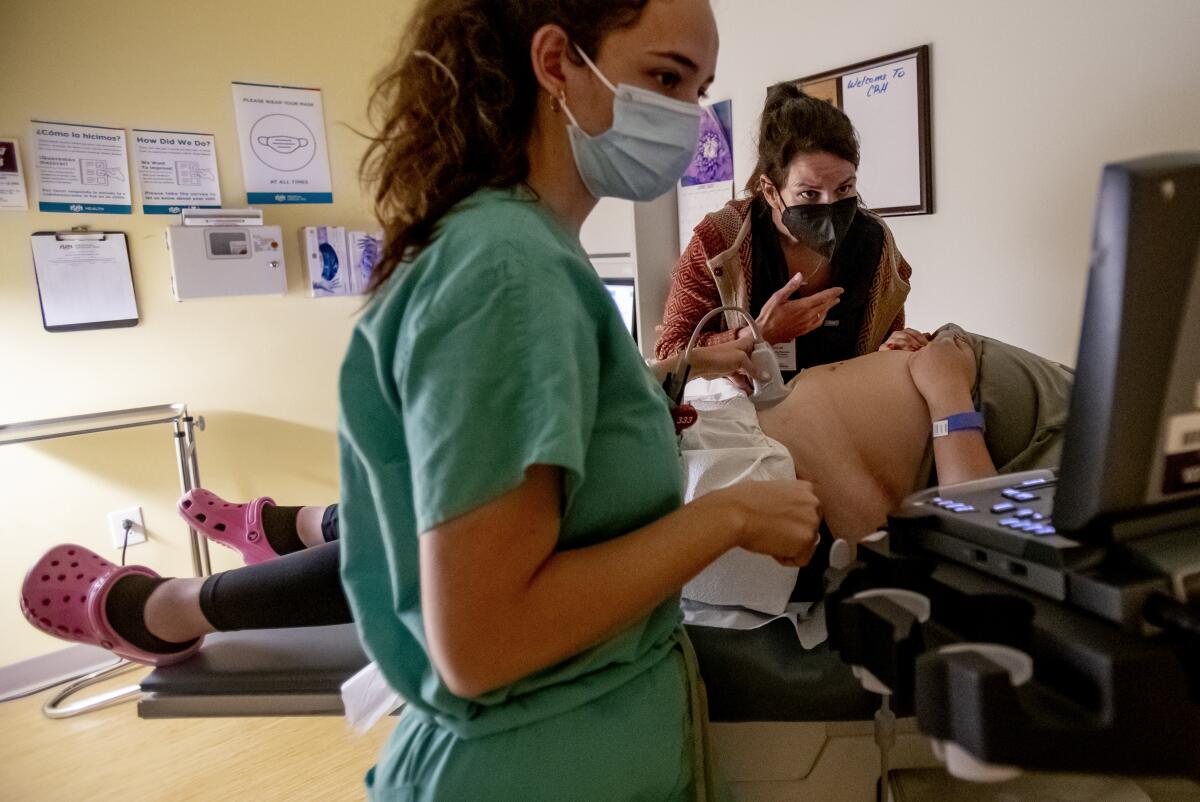New law allows doctors living in ‘hostile’ red states to get abortion training in California

SACRAMENTO — Gov. Gavin Newsom signed another round of reproductive health bills into law on Wednesday, including legislation that allows doctors living under “hostile” laws in states where abortion is banned to receive training in California.
The new California law comes as medical professionals in red states could face jail time for providing abortion care, and opportunities for abortion training are disappearing for obstetrician-gynecologists in places like Texas, where the procedure is banned.
“Radical politicians continue their all out assault on women’s health care with dangerous and deadly consequences. The right to an abortion is enshrined in California’s constitution,” Newsom said in a statement Wednesday. “We will continue to protect women and health care workers who are seeking and providing basic care.”
AB 1646 by Assembly member Stephanie Nguyen (D-Elk Grove) allows out-of-state graduates of accredited medical schools to participate in hands-on abortion training in California for 90 days — and be compensated for it — without securing a license from the state medical board.
It is part of the latest package of Democrat-backed bills that aims to make California a “sanctuary state” for abortion seekers following last year’s Supreme Court repeal of Roe vs. Wade, the landmark decision that protected a right to abortion nationwide. The decision has limited access to abortion for millions of women across the U.S.
While AB 1646 was designed with abortion in mind, the program is open to all physicians and surgeons who, after graduation, seek to train in California as part of required medical rotations in which they practice patient care while supervised.
The California Medical Board, which supported AB 1646, noted potential concerns about relaxing provider requirements but said the policy will not “negatively impact consumer protection” because trainees will be overseen by state licensed physicians.
Dr. Bria Peacock, an obstetrics and gynecology resident at UC San Francisco, hopes the legislation will attract more people like her. She plans to move back to her home state of Georgia when she completes her training in 2025, and applied to medical residency programs in California specifically looking for the best abortion training.
Even before the Dobbs vs. Jackson decision emboldened 22 states to ban or restrict abortion, Georgia had among the nation’s strictest laws. The Republican controlled state bans abortion at around six weeks.
Peacock has watched women in her Southern, rural community — especially Black women — struggle to get adequate reproductive healthcare, some who have traveled as far as Washington, D.C., for an abortion. At least half of the counties in her home state have no obstetricians, according to the Georgia Department of Community Health.
The same low-risk procedure performed during many abortions is also used routinely in hospitals after miscarriages and to resolve abnormal uterine bleeding, Peacock told California lawmakers in Sacramento during a legislative committee hearing this summer.
“The lack of this training is life altering,” she said. “When this tool is not a part of our training, thousands of people’s lives are at risk.”
Peacock said she knows being an abortion advocate in Georgia can come with personal risks but she is committed to working where she feels needed the most — and is hopeful laws there will one day change.
“It can be very dangerous to say how I feel and where I stand,” she said. “At the end of the day, it’s a medical procedure that’s between the patient and the doctor.”
While supporters of the latest reproductive health bills say precautions are necessary amid national uncertainty about access, Republicans who have voted against the bills say the focus on other states’ laws is misplaced.
“I think we should be focusing on the people of California rather than what’s going on in other states,” said Assemblymember Joe Patterson (R-Rocklin), who voted against AB 1646. “We have a lot of problems here — homelessness, a fentanyl crisis, you name it. I think that should be the focus of pretty much everything we do.”
Supporters of the bill, which include Planned Parenthood and the California Academy of Family Physicians, say it is a win-win: providers like Peacock who otherwise would not be able to learn abortion techniques can return to their home states if they so choose, while also temporarily helping with California’s provider shortage amid an influx of out-of-state abortion seekers.
While California has among the strongest abortion protections in the nation, and abortion medication is easy to obtain in the state, 40% of counties do not have a clinic providing surgical abortion, which is required for later cases, according to the Guttmacher Institute, a research group that supports abortion rights.
“There is hope that some come here and stay here,” Nguyen said of novice doctors. “We know there are women coming to California seeking abortion and we need all the help we can get.”
Last year, Newsom signed 13 abortion protection bills, including legislation that aimed to increase access by allowing nurse practitioners to perform abortions without the supervision of a physician.
Earlier this month, the governor signed SB 385 by Senate leader Toni Atkins (D-San Diego), which takes that further by allowing more physician assistants to perform abortions.
Other bills Newsom signed on Wednesday include measures to shield abortion providers in California who serve out-of-state patients from being punished by laws passed in other states and privacy protections for online reproductive health data.
“As abortions, contraception and other essential health care continue to be criminalized across the country, California is not backing down,” said state Sen. Nancy Skinner (D-Berkeley), chair of the Legislative Women’s Caucus.
More to Read
Sign up for Essential California
The most important California stories and recommendations in your inbox every morning.
You may occasionally receive promotional content from the Los Angeles Times.











